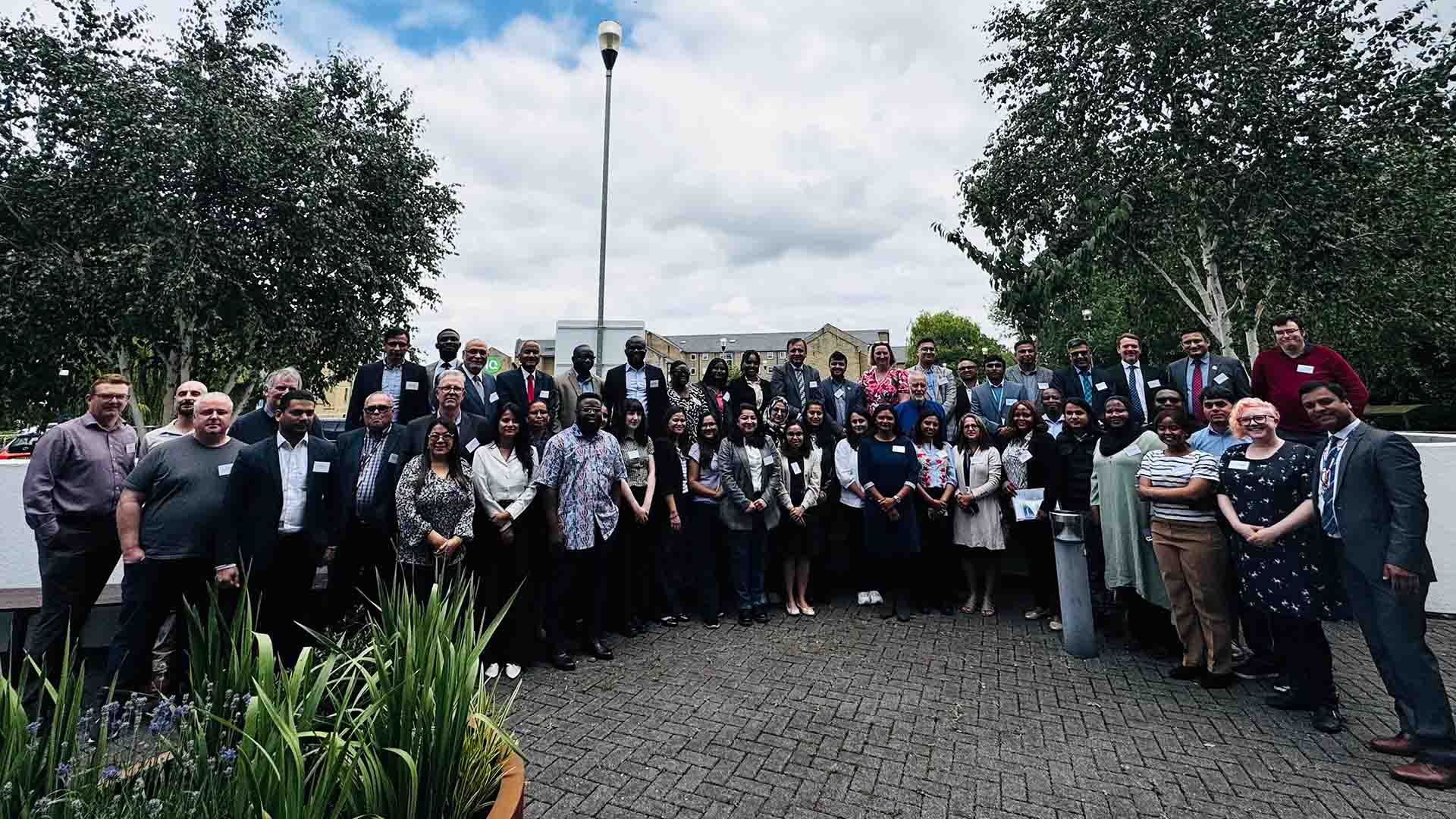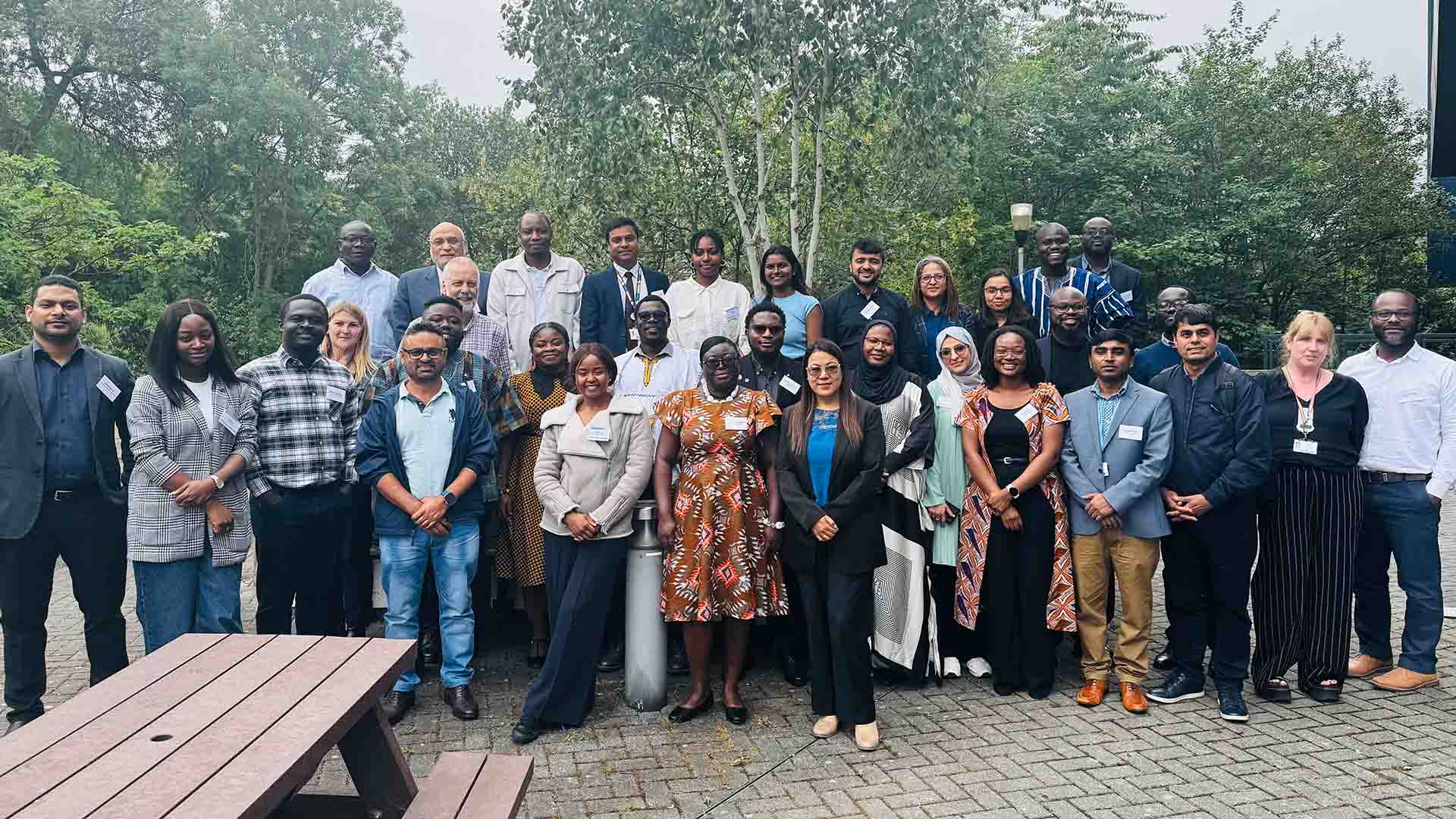University hosts third annual GCPHR meeting

An international array of over 70 delegates were in attendance when the University of Huddersfield hosted the Annual Meeting of the Global Consortium for Public Health Research (GCPHR).
Academics, policymakers, clinicians and researchers from around the world spent two days on campus for the third GCPHR yearly meeting.
In their opening remarks, Prof Padam Simkhada, GCPHR Lead and Professor of Global Health, alongside Prof Alistair Sambell, Pro Vice Chancellor (International), reflected on the significant progress GCPHR has made since its launch in 2023, emphasising its mission to strengthen equitable global partnerships and highlighting the university’s commitment to advancing impactful interdisciplinary and collaborative research worldwide.
Prof Simkhada says, “Tackling today’s global health challenges requires more than innovation. It demands meaningful, strategic partnerships that transcend borders, disciplines, and sectors. Together, we can shape a healthier, more equitable future, particularly as AI redefines the research landscape.”
Professor Jane Owen-Lynch, Pro Vice-Chancellor for Teaching and Learning and Dean of the School of Human and Health Sciences, welcomed the national and international delegates to the University of Huddersfield. She highlighted the importance of such events in celebrating the university’s research strengths, while reinforcing its commitment to collaboration, knowledge exchange, and global engagement.
The opening day of the conference, themed “Strategic Partnerships for Global Research and Innovation”, showcased the University’s leadership in fostering impactful international research collaborations. The day featured insightful presentations from global partners, including Professor Zahiruddin Quazi Syed and Professor Abhay Gaidhane from the Datta Meghe Institute of Higher Education and Research (DMIHER, India), who offered valuable suggestions to further the mission and strategic direction of the GCPHR.
AI on the agenda
The day concluded with the panel discussion exploring the future of national and global health research in the era of AI. Professor Phillip Brown showcased how housing research can be a driver of global public health change, Professor Paul Bissell highlighted the importance of addressing social determinants and health inequalities, while Professor Edwin van Teijlingen elaborated on the need and importance of interdisciplinary research in global health.
The panel also included Hari Krishna Neupane and Dr Bhupesh Mishra, who highlighted the importance of ethical use of AI in research and Responsible AI Framework for healthcare.

Ghana research highlights global issues
The second day, themed “Transforming Health in Ghana: Insights, Innovations and Collaborations in Research”, brought focus to the diverse and contextually rich health research initiatives in Ghana.
Precious Adade Duodu, Senior Lecturer in Nursing at the University of Huddersfield, set the tone for the day, which included a range of topics such as Strengthening Nursing and Midwifery Regulation in Ghana, a multi-country (Ghana, India, Nepal) longitudinal cohort study, unmet needs for breast cancer screening, mother’s awareness of malnutrition, evidence-informed policy making and advancing clinical practice through collaborations in Ghana.
The meeting closed with a panel discussion led by Dr Kofi Asare-Addo, Reader in Pharmaceutics, on building sustainable research partnerships aligned with Ghana’s national health priorities. Panellists included distinguished experts Professor Alfred Edwin Yawson, Professor Victoria Bam, Mrs Philomena Wooley, Professor Shyam Thapa, Dr Mary Abboah-Offei, Dr Yakibu Salifu and Dr Dartel Norman.
The discussions highlighted the future health priorities of research in Ghana as being centred on intervention-based research that addresses societal needs, and the need for continuous engagement in communicating research to promote sustainable and collaborative partnerships for the future.
The two-day event also featured an engaging poster exhibition, under the leadership of Dr Bibha Simkhada, Reader in Nursing and Deputy Director of Graduate Education in the Department of Nursing, showcasing over twenty research posters presented by our doctoral students within the School of Human and Health Sciences.
The majority of these PhD projects are based in low- and middle-income countries (LMICs), reflecting the university’s strong commitment to addressing global health challenges. The poster display highlighted the breadth and depth of student-led research, underscoring the university’s growing expertise and leadership in global health research, particularly in contexts where innovation and impact are most urgently needed.
Dr Rajeeb Kumar Sah, GCPHR Co-Lead and Reader in Public Health, reflected on the event, saying, “It was an honour to witness this two-day event evolve into a powerful celebration of global collaboration, meaningful dialogue, and a shared commitment to advancing public health research. The energy, passion, depth of discussion, and commitment demonstrated across every session were truly inspiring, highlighting the collective drive for positive change.”
The GCPHR was established in 2023 to promote international collaborations in public health, with the overarching aim of strengthening the global response to pressing health challenges through research, innovation, and policy engagement. After the success of the inaugural two-day meeting in June 2023 and the second annual GCPHR meeting in July 2024, this third convening of the consortium marked a significant milestone in our continued growth and shared mission.